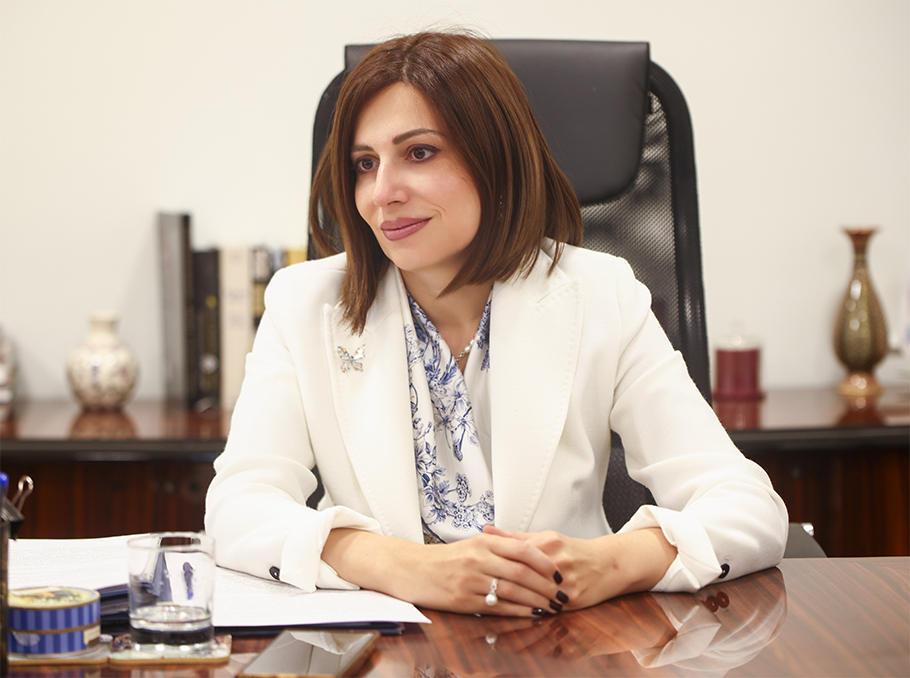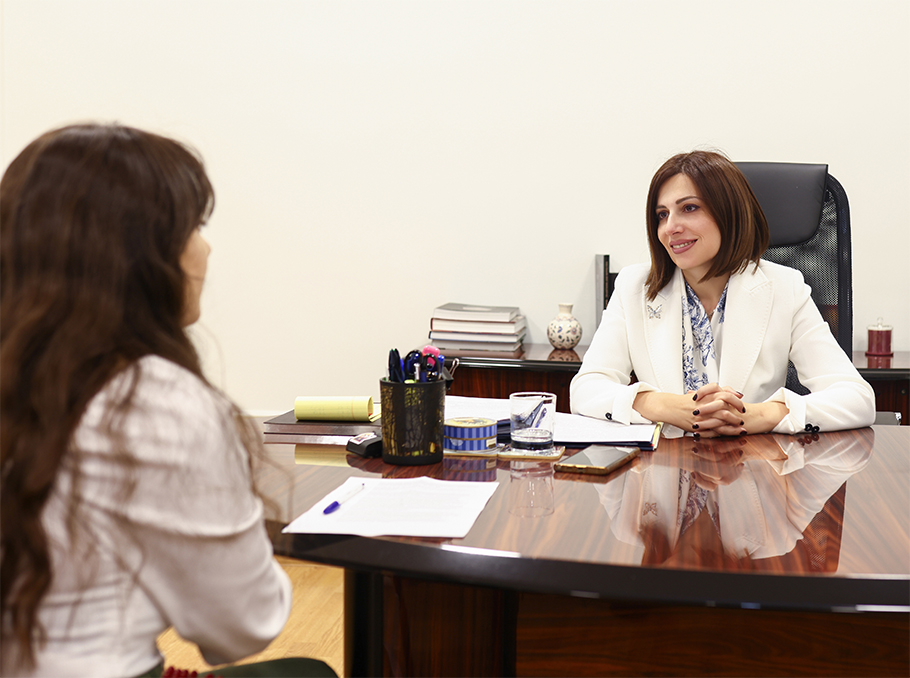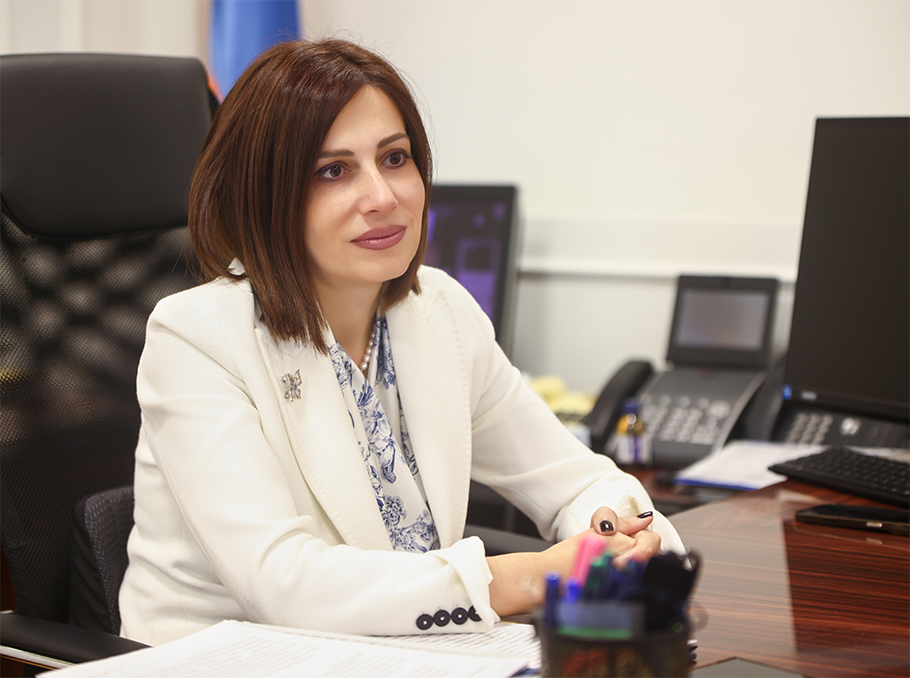Today, there is a clear global trend toward establishing bachelor’s and master’s degrees as the educational standard for the nursing profession — a direction strongly supported by the World Health Organization.
Back in 2022, the American University of Armenia (AUA) launched the Bachelor of Science in Nursing (BSN) program. The program’s first graduates have already joined Armenia’s healthcare system, bringing with them comprehensive, modern knowledge and skills.
Mediamax spoke with Anahit Avanesyan, Minister of Health of the Republic of Armenia and an alumna of AUA’s Master of Laws program, about the importance of the BSN program and the distinctive qualities of education at AUA.
- Ms. Avanesyan, as a graduate of the American University of Armenia, looking back on your education, how would you assess its role in shaping your professional path and preparing you for the challenges of your career?
- The education I received at AUA played a truly significant role. I am glad that, while pursuing my second year of a master’s degree at Yerevan State University, I made the decision to apply to the American University of Armenia and continue my studies there, ultimately earning a Master of Laws degree.
Those two years at AUA greatly transformed my perception of education, particularly in terms of adopting innovative approaches to learning. The University’s academic environment and culture were also quite distinctive — they complemented and, in many ways, completed my professional knowledge, experience, and overall educational journey.
- As your career progressed, leadership and decision-making skills — which hold a special place in AUA’s educational programs — became increasingly important. How has your education at AUA helped you in this regard?
- One of my favorite subjects was Legal Writing. During that course, we developed the ability to clearly and effectively present our thoughts and arguments, as well as practical skills for accurately conveying facts and conclusions during negotiations or when representing a client. I still remember and apply many of the principles from that subject to this day. Overall, AUA truly stood out in terms of public speaking and teamwork, bringing an entirely new quality to the educational process.
My education at Yerevan State University provided a strong theoretical foundation, while the AUA master’s program helped me develop the practical skills to apply that knowledge in real-world situations. I am convinced that such an educational experience plays a crucial role in the Armenian context, especially when it comes to leadership and career development.
- How do AUA graduates stand out locally and internationally?
- You know, every university transmits a certain culture. When we meet AUA graduates today, we easily notice shared approaches and ways of thinking: it’s the result of having gone through a similar educational journey. We continue to remain in close contact, and whenever we meet in different professional settings, communication is always easy, fast, and effective. Of course, the education we received at AUA plays a major role in that.
- In 2022, AUA launched the Bachelor of Science in Nursing (BSN) program, whose first graduates, equipped with new knowledge and skills, have already joined the healthcare system. How would you assess the significance of this program?
- I am truly delighted about the launch of AUA’s BSN program. And honestly, no matter how much I emphasize its importance, it would be impossible to overstate the impact it will have.
The development of the healthcare system — and, most importantly, the patient’s recovery and overall experience — largely depends on our nurses, both women and men. We cannot speak about quality care or positive outcomes unless the entire medical team — doctors and nurses alike — possesses strong educational foundations, clearly defined roles, and a shared, unified approach to their work.

Photo: Mediamax
For example, knowing how to properly plan and implement patient care, or how to organize the critical postoperative process, are responsibilities that primarily rest with nurses. I also find it essential to highlight the cultural aspect of the profession — the need to revalue the importance of nursing, elevate its professional standing, and thereby enable continued progress in the field.
- A 2020 study by AUA’s Turpanjian College of Health Sciences revealed that, for a long time, the nursing profession in Armenia was not viewed as an independent field. Nurses were often seen as assistants to doctors, rather than independent specialists. How would you assess the situation today, and what role can AUA’s BSN program and its graduates play in breaking these stereotypes?
- Even during the implementation of this educational program, which we promoted together with the Ministry of Education, Science, Culture and Sports of the Republic of Armenia, we encountered many stereotypes. I am very glad that, through joint efforts, we were able to challenge those perceptions and eventually establish a bachelor’s degree in nursing in Armenia.
The general perception was that this field required only secondary vocational education. Yet today, around the world, there are even Ph.D. programs in nursing, and the profession itself is recognized as independent, essential, and continually evolving.
It is important to strengthen this understanding in Armenia as well — within medical institutions, among patients, and across society — gradually increasing trust in the profession.
When discussing this field, we should also remember that it includes both women and men: both female and male nurses. The absence of a gender-neutral term in Armenian has, in some ways, contributed to the persistence of stereotypes. We often discuss what would be the right name for the profession, but for now, I think it’s a topic best left for public debate. It would indeed be interesting to hear different suggestions.
- What impact can AUA graduates have in terms of strengthening the role and confidence of both female and male nurses?
- I am truly delighted and deeply moved by the feedback from nurses who have completed this program. Recently, I met a senior nurse at one of our medical centers who expressed immense gratitude for finally having the opportunity to obtain higher education in her field. She loves the nursing profession deeply and never aspired to become a doctor — her goal was simply to enhance her skills and continue advancing as a nurse. This program made that possible for her. I believe this is the greatest acknowledgement.
- Today, there is a global trend toward making higher education the standard for the nursing profession. How important is it for Armenia to keep pace with this trend? What policies are being developed in this direction, and are there plans to introduce a tiered system for nurses in line with international standards?
I believe that certain positions in medical centers should be linked to holding higher education. We will eventually reach a stage where, for example, the educational requirements for the role of senior nurse will be raised. At present, many of our senior nurses occupy these positions thanks to their years of experience, knowledge, and practical skills. However, I am confident that, in the future, we will see progress toward properly defining and distributing roles based on educational qualifications.

Photo: Mediamax
Our next steps are aimed precisely at this: establishing a clear hierarchy within medical centers, so that the responsibilities of nurses with different levels of education are well-defined. This will also allow both female and male nurses with higher education to find their rightful place in the labor market. It’s an important step, as these professionals invest in their education, and the labor market must respond appropriately.
Gradually, our healthcare system is placing greater emphasis on quality. We already have mandatory quality specialists in all medical centers, and we plan to introduce specific roles focused on quality control within the nursing sector. In this context, higher education will serve as the key criterion for selecting those specialists.
- In addition to clinical knowledge, AUA’s Bachelor of Science in Nursing program emphasizes leadership, quality of care, patient safety, and research skills. How do you think these factors can shape the future role of nurses in Armenia?
- The skills you mentioned are extremely important because a medical center or operating room functions like an orchestra, with each participant playing a clearly defined role, and everyone must perform their part precisely to achieve the desired outcome.
Our healthcare system needs professionals who can provide proper guidance to newly recruited staff, and this is where leadership and organizational skills become essential.
Research skills are equally critical, as they allow nurses to continually improve upon accumulated experience. Knowledge must be regularly updated in line with advancements in the field and the study of innovative approaches.
- And finally, as an AUA graduate, what message would you convey to future students considering the Bachelor of Science in Nursing program, especially those who may still question the value of a bachelor’s degree in Armenia?
Being part of a new program is always a significant advantage. Just as first-year students at AUA take pride in being the first graduates and cherish that distinction, in the coming years, those who pursue higher education in nursing will belong to a generation that can be proud of their initiative and the courage to embrace an innovative approach, while also positioning themselves for more advanced roles in the labor market.
I wholeheartedly encourage everyone to apply to AUA’s Bachelor of Science in Nursing program. I am confident that this educational experience will play a crucial role in shaping and advancing each student’s professional career.

















